
The Barber of Seville, or The Useless Precaution is an opera buffa in two acts composed by Gioachino Rossini with an Italian libretto by Cesare Sterbini. The libretto was based on Pierre Beaumarchais's French comedy The Barber of Seville (1775). The première of Rossini's opera took place on 20 February 1816 at the Teatro Argentina, Rome, with designs by Angelo Toselli.
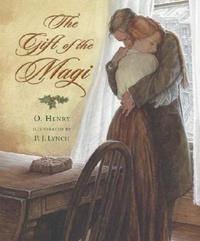
"The Gift of the Magi" is a short story by O. Henry first published in 1905. The story tells of a young husband and wife and how they deal with the challenge of buying secret Christmas gifts for each other with very little money. As a sentimental story with a moral lesson about gift-giving, it has been popular for adaptation, especially for presentation at Christmas time. The plot and its twist ending are well known; the ending is generally considered an example of cosmic irony. The story was allegedly written at Pete's Tavern on Irving Place in New York City.

Orfeo ed Euridice is an opera composed by Christoph Willibald Gluck, based on the myth of Orpheus and set to a libretto by Ranieri de' Calzabigi. It belongs to the genre of the azione teatrale, meaning an opera on a mythological subject with choruses and dancing. The piece was first performed at the Burgtheater in Vienna on 5 October 1762, in the presence of Empress Maria Theresa. Orfeo ed Euridice is the first of Gluck's "reform" operas, in which he attempted to replace the abstruse plots and overly complex music of opera seria with a "noble simplicity" in both the music and the drama.
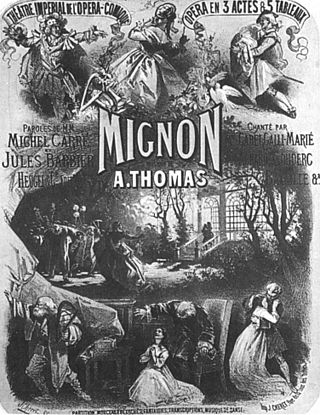
Mignon is an 1866 opéra comique in three acts by Ambroise Thomas. The original French libretto was by Jules Barbier and Michel Carré, based on Goethe's 1795-96 novel Wilhelm Meisters Lehrjahre. The Italian version was translated by Giuseppe Zaffira. The opera is mentioned in James Joyce's "The Dead" and Willa Cather's The Professor's House. Thomas's goddaughter Mignon Nevada was named after the main character.
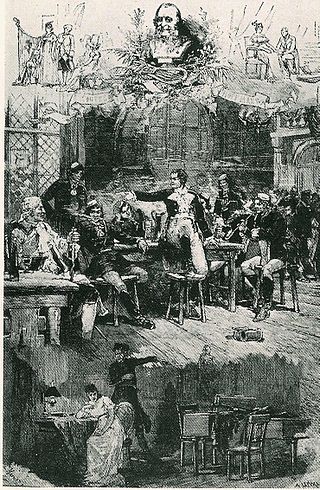
The Tales of Hoffmann is an opéra fantastique by Jacques Offenbach. The French libretto was written by Jules Barbier, based on three short stories by E. T. A. Hoffmann, who is the protagonist of the story. It was Offenbach's final work; he died in October 1880, four months before the premiere.

Mary Violet Leontyne Price is an American spinto soprano who was the first African American soprano to receive international acclaim. From 1961 she began a long association with the Metropolitan Opera, where she was the first African American to be a leading performer. She regularly appeared at the world's major opera houses, including the Royal Opera House, San Francisco Opera, Lyric Opera of Chicago, and La Scala; at La Scala, she was also the first African American to sing a leading role. She was particularly renowned for her performances of the title role in Verdi's Aida.
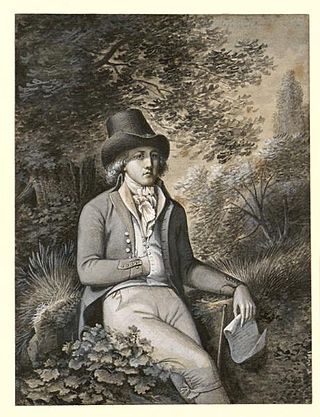
Andrea Chénier is a verismo opera in four acts by Umberto Giordano, set to an Italian libretto by Luigi Illica, and first performed on 28 March 1896 at La Scala, Milan. The story is based loosely on the life of the French poet André Chénier (1762–1794), who was executed during the French Revolution. The character Carlo Gérard is partly based on Jean-Lambert Tallien, a leading figure in the Revolution. It remains popular with audiences, though less frequently performed than in the first half of the 20th century. One reason for its survival in the repertoire is the lyrical-dramatic music provided by Giordano for the tenor lead, which gives a talented singer opportunities to demonstrate his skills and flaunt his voice. Giuseppe Borgatti's triumph in the title role at the first performance immediately propelled him to the front rank of Italian opera singers. He went on to become Italy's greatest Wagnerian tenor, rather than a verismo-opera specialist.
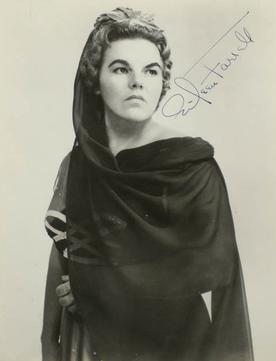
Eileen Farrell was an American soprano who had a nearly 60-year-long career performing both classical and popular music in concerts, theatres, on radio and television, and on disc. NPR noted, "She possessed one of the largest and most radiant operatic voices of the 20th century." While she was active as an opera singer, her concert engagements far outnumbered her theatrical appearances. Her career was mainly based in the United States, although she did perform internationally. The Daily Telegraph stated that she "was one of the finest American sopranos of the 20th century; she had a voice of magnificent proportions which she used with both acumen and artistry in a wide variety of roles." And described as having a voice "like some unparalleled phenomenon of nature. She is to singers what Niagara is to waterfalls."

David Conte is an American composer who has written over 150 works published by E.C. Schirmer, including six operas, a musical, works for chorus, solo voice, orchestra, chamber music, organ, piano, guitar, and harp. Conte has received commissions from Chanticleer, the San Francisco Symphony Chorus, Harvard University Chorus, the Men’s Glee Clubs of Cornell University and the University of Notre Dame, GALA Choruses from the cities of San Francisco, New York, Boston, Atlanta, Seattle, and Washington, D.C., the Dayton Philharmonic, the Oakland Symphony, the Stockton Symphony, the Atlantic Classical Orchestra, the American Guild of Organists, Sonoma City Opera, and the Gerbode Foundation. He was honored with the American Choral Directors Association (ACDA) Brock Commission in 2007 for his work The Nine Muses, and in 2016 he won the National Association of Teachers of Singing (NATS) Art Song Composition Award for his work American Death Ballads.

Jake Heggie is an American composer of opera, vocal, orchestral, and chamber music. He is best known for his operas and art songs as well as for his collaborations with internationally renowned performers and writers.

War and Peace is a 1946 230-minute opera in 13 scenes, plus an overture and an epigraph, by Sergei Prokofiev. Based on the 1869 novel War and Peace by Leo Tolstoy, its Russian libretto was prepared by the composer and Mira Mendelson. The first seven scenes are devoted to peace, the latter six, after the epigraph, to war.
Hugh the Drover is an opera in two acts by Ralph Vaughan Williams to an original English libretto by Harold Child. The work has set numbers with recitatives. It has been described as a modern example of a ballad opera. Contemporary comment noted the use of humour and the role of the chorus in the work, in the context of developing English opera.
Tartuffe is an opera in three acts by Kirke Mechem. Mechem also wrote the English libretto. Based on the Molière's play Tartuffe, or the Impostor, it is a modern opera buffa set in Paris in the 17th century. Tartuffe premiered on May 27, 1980, at the San Francisco Opera It has since seen over 400 performances in six countries and been translated into German, Russian, Chinese, Japanese and Czech. A "number opera" with arias, duets, trios and ensembles, Tartuffe is one of the most performed operas by an American composer. Also often sung is Mechem's choral arrangement of the song "The Lighthearted Lovers," excerpted from Dorine's aria, "Fair Robin I Love."
Boris Goldovsky was a Russian Empire-born conductor and broadcast commentator, active in the United States. He has been called an important "popularizer" of opera in America. As an opera producer, conductor, impresario, and broadcaster he was prominent within the American operatic community between 1946 and 1985.

Bajazet is an Italian opera in 3 acts composed by Antonio Vivaldi in 1735. Its libretto was written by Agostino Piovene. It was premiered in Verona, during the Carnival season of that year. It includes a three-movement sinfonia as an introduction. The story is about the fate of Bajazet after being captured by Tamerlane. The famous aria "Sposa son disprezzata" is from this opera.
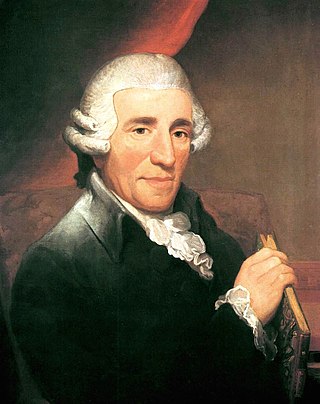
Il mondo della luna, Hob. XXVIII:7, is an opera buffa by Joseph Haydn with a libretto written by Carlo Goldoni in 1750, first performed at Eszterháza, Hungary, on 3 August 1777. Goldoni's libretto had previously been set by six other composers, first by the composer Baldassare Galuppi and performed in Venice in the carnival of 1750. It was then adapted for Haydn's version of the opera, which would be performed during the wedding celebrations of Count Nikolaus Esterházy, the younger son of Haydn's patron, Prince Nikolaus Esterházy, and the Countess Maria Anna Wissenwolf. It is sometimes performed as a singspiel under its German title Die Welt auf dem Monde.

Georgette "Géori" Boué was a French soprano, particularly associated with the French repertory, especially Marguérite, Thais and Salomé (Massenet). She was born in Toulouse. Following her career in France and other European centres, she was a teacher and "perceptive observer of the French operatic scene".

The Amber Witch is an opera in four acts composed by William Vincent Wallace to an English libretto by Henry Fothergill Chorley, after Lady Duff-Gordon's translation of Meinold's Maria Schweidler: Die Bernsteinhexe.
Gwyneth Van Anden Walker is an American music educator and composer.